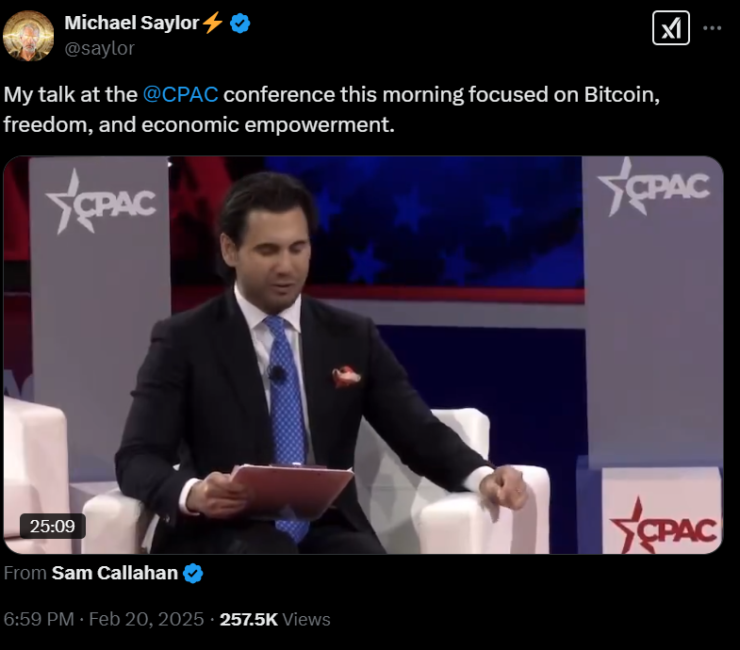Michael Saylor, founder of Strategy (formerly MicroStrategy), has called for the United States to acquire 20% of Bitcoin’s total supply, arguing that such a move would strengthen the dollar, enrich the nation, and potentially eliminate national debt.
“There’s only room for one nation-state to buy up 20% of the network, and obviously, I think it should be the United States,”
Saylor said at the CPAC conservative movement conference in Washington, D.C., on February 20.
At current prices, 20% of Bitcoin’s circulating supply equates to approximately 4 million BTC worth roughly $392 billion.
But would such a massive Bitcoin accumulation make the U.S. a global crypto powerhouse or trigger a new era of economic and geopolitical tension?

Saylor’s Case for a U.S. Bitcoin Reserve
Saylor, whose firm holds more Bitcoin than any other public company, believes the U.S. government must act before rival nations do.
“You wouldn’t want the Saudis to buy it first, or the Russians, or the Chinese, or the Europeans,” he warned.
To Saylor, Bitcoin is not just an investment, it’s a strategic asset akin to oil or gold. He compared his proposal to the U.S. Strategic Petroleum Reserve, which holds 395 million barrels of oil worth just $29 billion a fraction of the potential Bitcoin reserve’s $392 billion valuation.
Saylor insists that Bitcoin’s scarcity, decentralization, and independence from government control make it uniquely suited for a national reserve asset.
“Bitcoin is a commodity, an asset without an issuer,” he said. “There is no company, no individual, no country, no entity that can corrupt it, and it has reached escape velocity.”
Could Bitcoin Pay Off the U.S. National Debt?
One of Saylor’s most ambitious claims is that owning 4 to 6 million BTC could help the U.S. pay off its $34 trillion national debt.
While Bitcoin’s fixed supply of 21 million coins makes it an attractive store of value, the idea that 4 to 6 million BTC could erase decades of government borrowing raises questions:
- Would Bitcoin’s price skyrocket if the U.S. began acquiring large amounts, making debt repayment feasible?
- Or would regulatory uncertainty and political resistance prevent Bitcoin from ever becoming a recognized national asset?
- Could other governments rush to accumulate Bitcoin, leading to an economic arms race in digital currency reserves?
The Bigger Picture: Bitcoin as a Geopolitical Asset
Saylor’s proposal underscores Bitcoin’s growing role in global finance, particularly as some nations explore alternatives to the U.S. dollar.
- El Salvador has already made Bitcoin legal tender, and its government actively holds Bitcoin as a national reserve.
- The BRICS nations (Brazil, Russia, India, China, and South Africa) have explored creating a new global reserve currency, could Bitcoin become part of this conversation?
- China has cracked down on crypto mining and transactions while aggressively developing its central bank digital currency (CBDC), the digital yuan a clear signal of financial strategy shifting toward digital assets.
If nation-states begin competing for Bitcoin reserves, it could reshape the global financial system in ways previously unimaginable.
Why This Matters for Bitcoin Investors
Saylor’s comments highlight a broader institutional shift toward Bitcoin adoption.
His own company, Strategy, has been at the forefront of corporate Bitcoin accumulation:
- The firm owns 478,740 BTC—worth $47 billion at current prices.
- With a 51% profit margin on its Bitcoin holdings, Strategy has seen its stock surge 360% in the past year.
Saylor also predicted that capital will continue to flow from physical to digital assets, stating:
“The 21st century is going to be a billion AIs thinking a million times a second. What are they going to be using to move their money around? They’re going to use digital money because they can’t get a bank account.”
What Happens Next? Could the U.S. Actually Adopt Bitcoin as a Reserve Asset?
While Saylor’s vision is bold, there are major hurdles to a U.S. Bitcoin reserve:
- Regulatory Uncertainty – The U.S. government has taken a mixed stance on crypto, with the SEC cracking down on digital assets while other agencies explore blockchain’s potential.
- Political Resistance – A federal Bitcoin acquisition plan would require congressional approval, which could be a major roadblock.
- Market Disruptions – If the U.S. government suddenly started buying massive amounts of Bitcoin, would it trigger a supply shock or lead to increased regulatory restrictions?
For now, Saylor’s call for Bitcoin adoption at a national level is aspirational, but as global finance continues to embrace digital assets, the idea may not be as far-fetched as it once seemed.
Final Thoughts
Saylor’s push for a U.S. Bitcoin reserve is a high-stakes bet on the future of digital money.
If the U.S. were to secure 20% of Bitcoin’s supply, it could solidify its financial dominance for decades, but failing to act could allow other nations to gain a strategic advantage in the digital economy.
Will Washington take Saylor’s advice? Or will another country make the first move in the race to dominate Bitcoin reserves?





